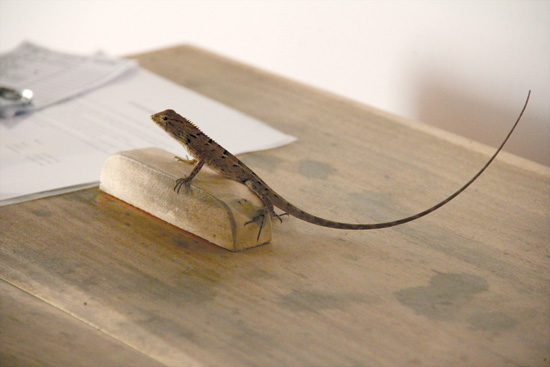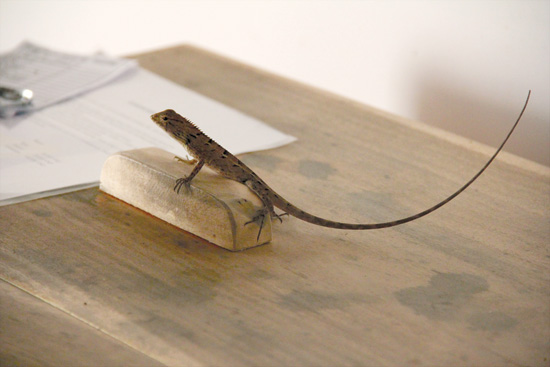(No.1, Vol.2, Jan 2012 Vietnam Heritage Magazine)


I am at the moment writing a story involving a Reptilian Parliament. The story is sympathetic to lizards. So it was with heightened interest that I observed what I would call the Lizard of Plantation Bungalow 10. But I would put LPB10’s genial behaviour down not necessarily to just a response to the joy I must have exuded at the sight of him/her, of whatever species. I would say the openness, fearlessness and playfulness of LPB10 – and a veritable desire to engage with humans – could have been be due to the good behaviour of the humans that over months and years went up and down the half-dozen wooden steps that led to the veranda of the bungalow, number ‘P10’, at Mango Bay Resort, on the large island of Phu Quoc, in the southwest of Vietnam.
I first saw LPB10 at the bottom of the steps. I went inside to get my camera and LPB10 was still there when I came out. It did not seem to matter how close I got to take his/her picture, 100 cm . . 50 cm. 20 cm. LPB10 stayed there, his/her body in the sun and head in the shade. The second and final time we saw LPB10 on our three-night stay he/she came into the bungalow. He/she posed on the weathered-grey boards of the veranda, creating elongated shadows, including one that made his or her already very long, thin, tail far longer. The sun was shining from over the Gulf of Thailand, where it sets directly facing the MBR. The sunset is so spectacular that when I said to a fellow bather that ‘The sun is lying down on the sea’ I was believed, and believed again when I said, ‘Yes, you can see the steam.’

LPB10 came in the door and stopped on the spacious floor, which is of polished cement with grey particles in it. He/she stopped and cocked his/her head so that one eye looked directly at us. He/she climbed a little way up a leg of the four-poster bed next to where electrical wires were plugged in, some of which were the diameter of LPB10’s tail. In many of the shots I got of LPB10, his/her hacksaw-like back was dramatic. You could imagine grabbing LPB10 by the tail and doing metalwork, because the teeth of his/her saw would face toward your hand and would be of exactly the right size. This lizard, Hacksaw, as he/she may end up being called, will be in the story involving the Reptilian Parliament, because the encounter with him/her on our visit to Phu Quoc cannot just be written off as ‘a bit of a coincidence’.
LPB10 seemed to be, as you see in some more conventional resorts, I kind of butler showing new guests how to use the room. It’s about the wooden boards, the wide, uncluttered floor, the fact that you can charge your information appliance but not have opinionated financial blather-mouths appear on a TV in your space. ‘How dare that man come into my living room and speak to me like that?’ my admiral uncle said, when TV arrived in the bungalow where he retired beside Sydney Harbour. After basking with the wires, LPB10 climbed on to the wooden box inside which is a Styrofoam box, where drinks or the fish you catch can be stowed for you with ice. LPB10 posed on the handle of the box, as if on the top of a mountain, and posed with the bottle-opener and drink list, as if to suggest how you could congratulate yourself for taking a walk in the nearby national park. LPB10 was so enthusiastic that I had to encourage him/her to leave, by pulling the door curtain aside. How was I to manage a whole parliament of lizards of this vitality?
But LPB10 lived in a very particular situation. MBR has been there for quite a few years. The wooden steps, at the side of which I got my first photographs of LPB10, though they are strong, show considerable age and, whatever the marvellous hardwood they are made from, are going to need renewing with new marvellous hardwood. What I fear is the tradesperson who does the work. Or does MBR have its own person, trained in-house, to its ethic? Because the guests in all the bungalows in the Plantation – which is named this way not to signify banana trees but the vast amount of space there is between the bungalows – are well mannered and probably as animal-loving as those of the English who don’t like hunting. Going up and down the steps of the bungalows, these dog-lovers have been delighted by types like LPB10, and types like LPB10 have got to like them. One of the things that draws me to this observation is a contrasting incident years ago at a conventional Vietnamese resort where a lizard appeared on a path and a guest, Vietnamese, remarked in words like, ‘What is that animal doing here? It is big enough to be worth VND30,000 ($1.43) in a restaurant.’
At MBR you hear a lot of European languages spoken. You can’t help looking up from breakfast when you hear, ‘Montaigne! Put that down.’ If you call a boy Montaigne, even if in the playground it is going to be plain ‘Monty’, doesn’t he have a licence from birth to pick up a lamp in a dining area and point it like a 12-gauge? A very small boy who seemed to be Monty’s brother seemed to have several small things such as buttons in his mouth, and his mother was trying to get them out, trying to explain in a matter-of-fact way to ‘Planty’ – probably short for Plantagenet – before he got them in his lungs, how much his mother, not to mention the resort and everyone, wanted to see them back in the daylight. The MBR has the civilisation of manners of an early, exotic settlement of
The north of the island, especially, has an atmosphere of bristling, buzzing nature that nowhere else I have been to in Vietnam has had. My favourite use of the resort is to lie on the bed and look at the high, A-shaped roof of woven-bamboo with thatch on top, and listen, via the air-space between the roof and the walls, to the birds and insects presenting musical numbers far too original to have been emulated by humans. Contrariwise, there was, this time, a certain species of insect that sang in the evening that sounded so like a mechanical sound made by humans that it was only if you walked under its trees and noticed that it quietened or stopped that you knew it was natural.
Walking on the many ochre paths between small farms, we found such things as flying seeds, some in the form of an umbrella with the seed as the handle and radiating from it pale, shiny filaments to form a canopy and some in the form of wings of pale, shiny films with the seed imbedded. This time what the locals called ‘curry’ trees were magnificent in white flowers and bristling, bright crimson pods and open pods with seeds that tasted like carrot. We were told there were also plants for making incense. We saw lots of butterflies, a green Christmas beetle (though I call it this only because it had the shape and our trip was shortly before Christmas) and a scorpion inlaid into a red road of laterite in a dark exoskeleton, the pieces of which had not been scattered in hundreds of runnings over by vehicles with tires.
In the water where we swam there were fish with yellow and black vertical stripes.
It was remarked to us that the animals were only small ones, however, and I sensed an implication that this meant the animals were not big enough to eat. On my previous visit to Phu Quoc I had overheard a conversation about smuggling out the large, Vietnamese-speaking – it can say its name – gecko the t?c kè for a decorative pet. A cormorant, black, slim and the size of a monkey, that twice swept past us as we bathed, must have descended from ones that had escaped hunters of the not-so-distant past, who must have had rifles and guns of the kind now on show at
Phu Quoc as a whole lately has been acutely occupied with the idea that, as a young Vietnamese man we encountered put it, it has about five years left as a destination of natural attributes. The island is thought to be in transition between two kinds of luxury, (A) one based on nature and (B) one based on the things that conventionally bring rating stars to hotels and resorts, like swimming pools and spas, that fit with a casino or casinos and an ‘international airport’.
Phu Quoc still has its national park, in the north of the island, as far as I know.
The fish with yellow and black vertical stripes at MBR may depend, for all I know, on a marine reserve the resort has negotiated but which I understand is not rigorously respected by local fishing people.
At foreigner-owned and -managed small enterprises of the type naturally to think their success lay on road A, on the state of the island as an island, with the attributes it was born with, we heard that the stink of sewage still came from some resorts along Long Beach, on the opposite side of the main town, D??ng ?ông, from MBR, though the beach had less rubbish on it these days. On the question of whether they would go on, several of these road A enterprises had the same answer: ‘Why should we?’

,,
,,

